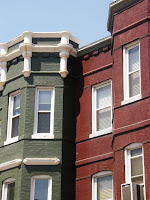Water damage – whether caused by leaks or condensation – can do more than cause unsightly stains in your home.
It can cause permanent structural damage to the home and erode its strength.
When damage is from poor or infrequent maintenance, neglect or general deterioration, water damage isn’t
covered by your insurance policy. But proper home maintenance can help you prevent messy and costly repairs to
your home. Defend your home by stopping that leak before it starts.
Start with the roof
• Check your roof once a year. To avoid damage, keep your weight directly on the rafters. If you have a bowstring or low-pitch rafter, place a plywood sheet across the rafter so you can distribute your weight evenly.
• Check for corrosion or deterioration of your roof; wind or hail damage; improper installation of vents, flues, chimneys, air conditioners, etc.
• Inspect your roof for punctures or cracks. Clean any you find and apply a compatible patching compound or sealant.
• Clean and inspect rain gutters and downspouts for leaks or holes. Remove dirt, leaves, branches and any other debris on your roof or gutter.
• Seal manufactured home metal roofs with a good roof coating at least every other year – or more often in damp or warmer climates. Apply around all vents and seams, coating along the drip edge of the roof. Cover all exposed screw heads, fasteners and other areas susceptible to leaking.
• Look for and repair loose, damaged or missing shingles, vent caps, raised nail heads and anything else in disrepair.
Check your home’s exterior
• Inspect outside walls, doors and windows each spring and fall for unusual wear or tear. Water and moisture can penetrate these common areas if they’re not maintained regularly.
• Repair or replace caulk, weather stripping, glazing, window seals, door seals or any other exterior area damaged by use, abuse or normal weathering.
• Examine your exterior siding and replace any missing or damaged fasteners or screws. Repair or replace punctured siding.
• Remember to look under your manufactured home for a sagging, torn or water-spotted bottom barrier. This can indicate leaks as well as poor or damaged insulation, which may cause water lines to freeze and break.
• Check your home’s pneumatic storm door closer and safety chain. If these are loose or not working properly, the storm door may blow open and let water in.
Horizon Insurance has specialty insurance products.
Not only can you trust safety information from Horizon, but you can trust our broad insurance policies that give you the coverage you want.
Contact your local Horizon agent today for a policy that gives you more!
Choose Horizon
Check out our other insurance programs at HorizonIncome.com for Manufactured Homes,
Specialty Homeowners including Landlord, Vacant and Rental Properties, Motorcycles, Off-Road Vehicles, Motor Homes, Travel Trailers, Boats, Personal Watercraft and Collectible Autos.
http://www.horizonincome.com/
http://www.horizonincome.com/homeowners.html
http://www.horizonincome.com/condo+insurance.html
http://www.horizonincome.com/renters+insurance.html
http://www.horizonincome.com/personal+auto.html
http://www.horizonincome.com/motorcycles.html
http://www.horizonincome.com/commercial+property+insurance.html
http://www.horizonincome.com/business+owner+insurance.html
Water Damage Safety Tips
for Homeowners
Not all products available in all areas.


